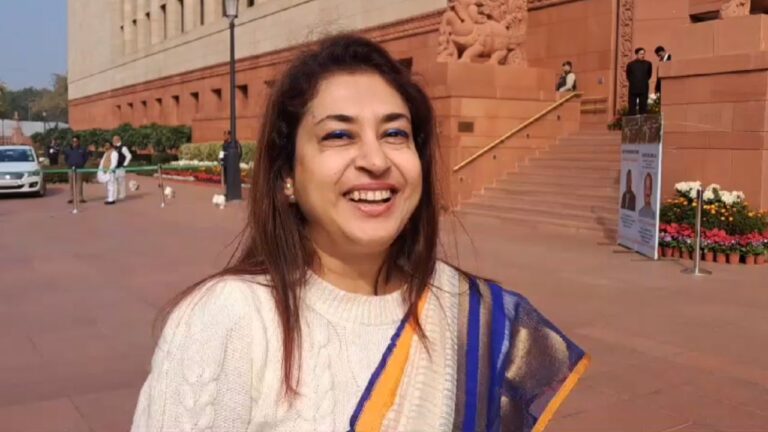News Desk, Kolkata : In the midst of the parliamentary session in the Lok Sabha, Trinamool Congress MP Shatabdi Roy’s words about Ram Mandir have stirred quite a debate. Despite facing opposition, she made it clear that she is a devout follower of Lord Ram. From her childhood, she has been enamored with writing, and since then, she has found solace in sleeping by inscribing Ram’s name on her bed. Shatabdi Roy’s deep-rooted devotion to Ram became evident on Monday when she mentioned it on the parliamentary floor.
Fast forward to January 22nd, the consecration ceremony of Ram Lalla took place at the Ram Mandir in Ayodhya. In the presence of Prime Minister Narendra Modi, the temple was opened to the public following the ritual. Devotees are seen waiting eagerly outside the temple daily. Shatabdi Roy, addressing the Ram Mandir issue in the Lok Sabha on Monday, remarked, “Those who can bring Ram Lalla, can they not bring Mehul Choksi?” This statement stirred discontent among Trinamool Congress MPs.
Later, facing the media, Shatabdi Roy clarified, “I have heard for ages that the divine has come to Earth. This is the first time I’ve seen people bringing God themselves. If they can bring Ram Lalla, why can’t they bring someone like Mehul Choksi?” This comment further fueled the disagreement among BJP MPs.
However, she emphasized that her statement did not oppose the construction of the Ram Mandir. Shatabdi Roy clarified, “We have no disagreement with Ram. We all believe in God. Since childhood, I have been sleeping by inscribing the names of Ram and Sita on my bed. Everyone in my family does the same.”
Moving beyond the parliamentary drama, on January 22nd, the consecration of Ram Lalla at the Ram Mandir in Ayodhya was a momentous occasion. The presence of Prime Minister Modi highlighted the significance of the event, and the subsequent opening of the temple for the public marked a historic moment for devotees.
The controversy sparked by Shatabdi Roy’s comments revealed the underlying tensions between political ideologies and religious sentiments. While her words were interpreted by some as questioning the priorities of bringing deities versus individuals accused of financial wrongdoing, others viewed it as an attempt to politicize the sacred.
As the nation witnessed the grandeur of the Ram Mandir consecration, the political discourse unfolded on different fronts. The BJP criticized Shatabdi Roy’s remarks, considering them a deviation from the sanctity of the occasion. Meanwhile, Trinamool Congress defended her, asserting that her statements were misinterpreted, and she remains a devout follower of Lord Ram.
In the aftermath, the media played a crucial role in shaping public opinion. Headlines echoed the clash between politics and religion, with debates intensifying on whether the sacredness of the Ram Mandir inauguration should be tainted by political rhetoric.
Shatabdi Roy’s clarification attempted to assuage the brewing tensions, emphasizing her unwavering faith in Lord Ram. However, the incident underscored the delicate balance between politics and religion in India, where even expressions of devotion can be scrutinized through a political lens.
In conclusion, the saga of Shatabdi Roy’s remarks on Ram Mandir unveils the complex interplay between faith and politics. As the nation rejoices in the completion of the sacred Ram Mandir, the incident serves as a reminder of the challenges in navigating the intersection of religious beliefs and political ideologies in contemporary India.
DISCLAIMER
Our news media denounces any form of bias and disapproves of sensationalism. The disseminated news is entirely educational and aimed at social awareness. Our media maintains absolute impartiality, adhering solely to the purpose of education and social consciousness.


